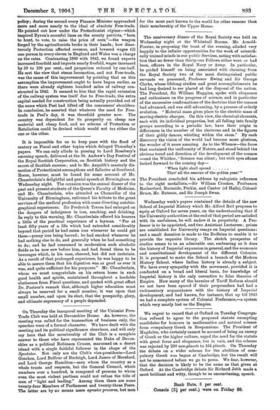The anniversary dinner of the Royal Society was held on
Wednesday night at the Whitehall Rooms. Mr. Arnold- Forster, in proposing the toast of the evening, alluded very happily to the infinite opportunities for the work of scientifi- cally trained minds in our public Services, noting with satisfac- tion that no fewer than thirty-one Fellows either were, or had been, officers in the Royal Navy or Army. In particular, he prided himself on being associated with claiming from the Royal Society two of the most distinguished public servants we possessed, Professor Ewing and Sir George Clarke, whose lifelong studies and great accomplishments he had long desired to see placed at the disposal of the nation. The President, Sir William Huggins, spoke with eloquence and enthusiasm on the progress of science, and in particular of the successive confirmations of the doctrine that the cosmos had advanced, and was still advancing, by a process of orderly evolution. "Material mass gives place to the electric mass of moving electric charges. On this view, the chemical elements, each with its individual properties, but all falling into family groups according to a periodic law, have their origin in differences in the number of the electrons and in the figures of their giddy dances, whirling within the atom." By each discovery the vision of the world had become more glorious, the wonder of it more amazing. As to the Whence—the force that sustained the uniformity of Nature, and stood behind the obvious trend and direction of the development of the cosmos —and the Whither, "Science was silent ; but with eyes aflame looked forward to the coming day— 'When light shall spread Thro' all the seasons of the golden year."
The President concluded his address by eulogistic reference to the eight medallists,—Sir William Crookes, Professors Rutherford, Burnside, Perkin, and Cantor (of Halle), Colonel Bruce, Mr. Bateson, and Sir Joseph Swan.






































































 Previous page
Previous page